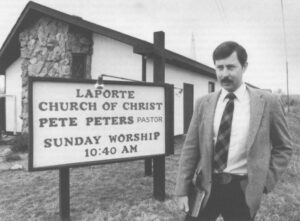New York–During her five-year journey through fundamentalism Laurie Hausman became a born again Christian, joined a strict church, married a youth leader in the congregation, worked as a missionary and had a child. For most of that time her new religion filled her deep need for community and spiritual certainty. She followed her pastor’s rules, giving up her writing, music and old friends, dressing modestly, attending services and accepting the subservience the church required of women. Immersed in her faith she found new friends, work and an entire way of life.
Hausman’s fundamentalist lifestyle began to break apart in her fifth year in the church, after her mother died. Hausman chafed at the church’s rules and was troubled because friends in the church said she had failed to convert her mother and save her from Hell. She was working two jobs to support her family, while her husband donated his time to God as a street-corner evangelist. He brought home drug addicts and street people who slept on the floor. She remembers one troubled man who used a pocket knife to carve designs into his arm while he leaned against the door to her son’s bedroom.
“I was alone and scared. My family wasn’t around to help me and my husband had his family and the support of the church,” recalls Hausman. “The people in the church suspected I was getting ready to leave. They showed up one night and talked to me for hours. They said that I should sign over custody of my son to my husband, that God would take care of him. They said they would lie in court anyway to make sure I wouldn’t get custody. I was still a little brainwashed then, I think. I signed and got out.”
Now out of the fold, Hausman is struggling to build a new life. She is allowed weekend visits with her son but holds little hope for ever becoming his full-time mother again. She works as an academic researcher and has built a new circle of friends. But every once in a while she begins to believe she is doomed to Hell because she left fundamentalism. Depression will wash over her and, for a while she feels tormented, torn between her old beliefs and her desire to be independent.
Laurie Hausman’s experience is unusual but not unique. After a decade-long surge, with millions of new members joining its churches, the fundamentalist movement is suffering thousands of casualties. As traditional fundamentalism has grown, so have the more radical groups on the extreme edge of the movement. Using group pressure, ominous prophesies and strict doctrine, this extreme fundamentalism overwhelms believers, making it difficult for them to lead functional lives. Mental health experts at hospitals and universities report increased numbers of patients who are victims of family violence, depression and other disorders connected with their religion. The outside experts and the troubled believers are discovering that fundamentalism may come with a price.
The most stirring example of fundamentalism gone awry, involving the suicide of a California man who was under Bible-guided counseling, will be examined in a California Court of Appeals case in 1989. The man’s parents have charged that leaders of his church contributed to their son’s suicide because they rely too heavily on Scriptures, rather than mental health professionals, to counsel emotionally troubled believers.
The case of Kenneth Nally will mark the first full examination of the complex legal issues surrounding religion and mental health. But the fallout from the fundamentalist phenomenon has caused so much concern among psychotherapists that a ,growing number are already warning that extreme fundamentalism poses the same dangers as religious cults. This summer, at its annual convention, the American Psychological Association conducted its first panel discussion of fundamentalist-related disorders. Participants presented papers describing a range of emotional problems associated with extreme fundamentalism, including depression, loss of self-esteem, chronic feelings of guilt and social isolation.
“What I call New Fundamentalism has, in some cases, begun to cross over into unhealthy religion, to make people dysfunctional,” says Dr. Wayne Oates, who directs the pastoral counseling center at the University of Louisville Medical Center. “I’m seeing it clinically in cases where people are exploited for money and for sex. They become disillusioned and then feel abandoned like a child. It can be a very debilitating thing.”
Oates, who is an ordained Southern Baptist preacher, says that both clergy and mental health experts are reluctant to probe the connections between powerful religion and mental illness. He began exploring the subject in the 1950’s when, as a young minister in a small town, he worked with church members whom doctors suggested “needed someone to talk to.” Oates went on to receive advanced degrees in psychology and to write a series of books on religion and mental health- He is considered a founder of the fledgling field of pastoral counseling, which combines religious insights and psychotherapy. “Everyone is afraid of pointing to the ultimate example, Jonestown, and afraid to remind people that it could happen again,” Oates said. Jonestown, Guyana, was the site of a mass murder/suicide of followers of preacher Jim Jones, who started his congregation as a Christian-oriented church. Jones’ church evolved into a communal cult that followed his messianic visions to South America and death.
Oates makes a distinction between what he calls “traditional Billy Graham fundamentalism” and “new fundamentalism.” Traditional fundamentalism, said Oates, refers to a firm belief’ in the Bible “that doesn’t overwhelm your life.” Traditional fundamentalists “are positive, loving people with a firm faith but with a tolerance and appreciation of others.” Oates believes the “New Fundamentalism,” which arose in the 1970’s, takes Graham’s piety beyond religious conviction to a entire authoritarian social outlook.
“The New Fundamentalism is an all or nothing thing, a person is either with us or against us. It is characterized by very strong preachers and very dependent followers who have an adoring attitude.” In the new fundamentalism, says Oates, there is a danger of the church and the church leaders overwhelming the lives of regular believers.
While another Jonestown may be unlikely, critics of fundamentalism say that everyday believers can be exploited, as thousands were in the recent PTL scandal. PTL, a mammoth organization built by evangelist Jim Bakker, took millions of dollars in donations for a time-share resort hotel that has never opened. Contributors, who sent $1,000 or more for brief annual stays at Bakker’s resort, have been unable to recover their money, or use the promised hotel. Over the past year, PTL members have watched in dismay as revelations of Bakker’s multi-million-dollar income, lavish lifestyle and sexual encounters have been displayed almost weekly in the media. Jessica Hahn, a church secretary whose sexual encounter with Bakker started the unraveling of the PTL empire, could be considered another victim. A fundamentalist who followed PTL, she says she was raped by Bakker and another preacher after they enticed her to Florida to watch a taping of a television broadcast.
The PTL scandal helped fuel a dramatic increase in membership of the only organization for former fundamentalists, Fundamentalists Anonymous. Styled after Alcoholics Anonymous, FA was founded in 1985 by two former fundamentalists who believed that those leaving the fold need a base of support. In two years FA has grown to include 40,000 active members who attend weekly support meetings in more than 60 cities nationwide. FA’s annual operating budget, raised by donations, has grown from the initial $30,000 put up by its founders to more than $1 million.
“In some fundamentalist groups the isolation from society is extreme,” notes James Luce, one of FA’s founders. Believers can, if they choose, send their children to Christian schools, restrict the information they see to Christian television and periodicals and even work in Christian-oriented businesses. “A person can get deeply involved and find themselves virtually directed by what the pastors or their peers in a church tell them to do,” says Luce.
Violent Christianity
In the most extreme cases, Luce reports, women and children in violent fundamentalist families suffer further abuse while struggling to follow a religion that teaches them to stay in the home despite beatings. “We have members whose children have been maimed, who have been maimed themselves, because their religion teaches them to stay in a bad situation and may even blame them, saying they are bad and that’s why there is violence directed against them,” he said. Problems can go unnoticed, Luce adds, if a family lives within a kind of fundamentalist subculture where outside help is discouraged. FA’s files are filled with case studies of former fundamentalists who say religion became so powerful in their lives that they were unable to have relationships or make rational decisions.
The growth of fundamentalism is considered, by some experts, to be the final stage of a general trend begun in the social upheaval of the 1960’s. Marc Galanter, a psychiatrist at Einstein Hospital and author of several papers on religion and psychiatry, suggests that extreme fundamentalism is a socially acceptable alternative to Eastern cults. Many fundamentalist groups follow complex, legalistic doctrine and are led by very powerful, charismatic figures. But because they are Christian, Galanter says, critics are reluctant to question their practices. “Fundamentalism is considered to be more mainstream, but it could also be considered an extension of the cult phenomenon of the 60’s,” says Galanter.
As with cults, young adults are particularly vulnerable to the pull of extreme Christianity. Fundamentalist groups have usurped the cults of the 1970’s on college campuses, using many cult techniques for slowly bringing young people into their organizations with friendships and non-religious activities. At New York’s Columbia University, for example, half a dozen different fundamentalist groups regularly canvas for new members. In the past decade Christian groups, with names such as Campus Crusade for Christ, The Navigators and The Way, have blossomed on campuses nationwide. Because they are locally managed, the dynamic in such groups depends largely on the local leaders. Some local leaders use their positions to take control of believers’ lives.
“Shepherding or discipleship groups are very big with young people right now,” says Philip Abramowitz, director of the Task Force on Missionaries and Cults for the Jewish Community Relations Council of New York. Discipleship and shepherding are techniques many fundamentalist groups use to closely monitor and direct the lives of believers. Using daily meetings to discuss every detail of life, the groups often direct the members’ most personal decisions about relationships, family or business. “Jews are of special interest to many fundamentalist groups because they believe Jews must be converted before the Second Coming of Jesus,” says Abramowitz. “They can put some heavy pressure on Jewish kids.” Young converts who want to break out of religious groups are turning, increasingly, to campus mental health clinics. “This problem, with extreme fundamentalism, is popping up more and more during intake interviews with students,” says John Powell, director of the counseling center at Michigan State University, which serves 42,000 students. Powell, a psychologist who is also a conservative Christian, has a special interest in religion and mental health.
“A primitive understanding of serious concepts such as hell or eternal damnation can be very disturbing,” Powell says. “Extreme fundamentalism also tends to inhibit self-expression, even artistic expression, which can be very damaging to a young person.”
Breaking Free
Laurie Hausman was a young Jewish woman from Brooklyn when she first encountered fundamentalism at a large, independent church in San Francisco. At age 24, she had left New York to live with friends on the West Coast. One of the people she met there was deeply involved in the church. She became interested and soon found herself declaring she was “born again” and committing her life to the direction of the church and the supernatural will of Jesus Christ. On visits home she would pressure her family, alienating them with her proselytizing.
“The church becomes a substitute for your family. People say they love you and they welcome you in and they do give you a kind of love, as long as you live by their rules,” she recalls. Through the church Hausman landed a job in Texas as a counselor at a fundamentalist-run residential treatment facility for troubled teens and young adults. She married another church activist, became pregnant and had her son.
“I used to believe that when something went right I had to give the credit to Jesus and when something went wrong it was because I was evil. When you believe that, you can’t ever feel good about yourself. Everything good belongs to God and everything bad is your fault,” Hausman says. “Now I’m just trying to live my life myself, taking what comes and appreciating the good things. But I always have the scar, the loss of my son. I think fundamentalism cost me my son.
Laurie Hausman left fundamentalism with the help of her family, a psychologist and an FA Support group. Richard Childs, a psychiatrist who runs an FA group in Kansas City, says the program brings together ex-fundamentalists, who benefit from knowing “they are not the only ones. There’s a tremendous fear, guilt and obsession people feel,” says Childs. “I don’t think FA challenges religion, it challenges the negative effects of religion when it goes too far.”
While Hausman was able to break away on her own, many fundamentalists have been taught to fear outsiders, especially counselors. The proscription on mental health services is reinforced by TV preachers who regularly lambaste psychologists and psychiatrists. TV evangelists Pat Robertson and Jimmy Swaggert both criticize mental health professionals, and Swaggert has even suggested that psychological counseling is inspired by Satan.
To meet their needs some groups inside the conservative Christian community are developing religiously-oriented approaches to the problems of highly orthodox religion. At Southern Baptist Seminary in Kentucky, which is one of the oldest Baptist seminaries in the country, students are trained to recognized religiously-influenced emotional problems and address them in a way that accommodates fundamentalist beliefs.
“A big part of fundamentalist theology emphasizes the idea that man is evil; literally that you are evil, lower than low. And no matter how you try, you cannot improve on that,” says Dianna Garland, a professor of social work at Southern. “If your husband is beating you, it is because you are evil. If you lost a job, it’s because you aren’t Christian enough. It becomes a trap, because then, if something good happens, you have to give all the credit to God. You can never have the credit and you can never escape feeling bad about yourself.” Garland has also found that substance abuse problems, alcohol and drugs, are routinely ignored by fundamentalists who believe the problems are so evil they cannot admit them.
Garland teaches an approach which combines positive Bible lessons and traditional psychology to build a feeling of self-worth. “The problem is, so many churches and pastors discourage people from seeking help that we might not even hear from people who have serious problems,” says Garland.
As more Americans become involved in fundamentalism, says Garland, the number who have trouble incorporating its rigid structure into their lives will grow. “Unfortunately too little is known about fundamentalism and its effects. One of the first steps will be to try to understand why in general, more and more people seem to want this kind of religion more and more. A lot of people are still working to understand that.”
©1987 Michael D’Antonio
Michael D’Antonio, a reporter on leave from Newsday, is reporting on Christian America.



